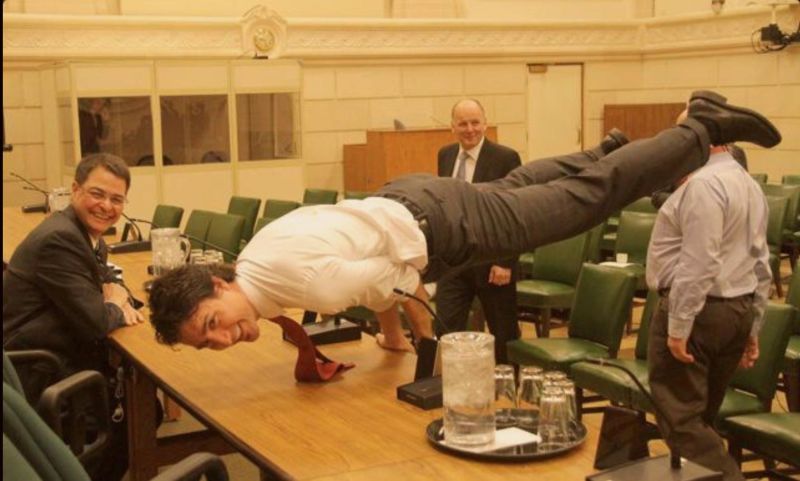Is Trudeau Gay? Exploring The Speculations And Facts

In recent years, questions surrounding the sexual orientation of prominent political figures have become increasingly common, and Canadian Prime Minister Justin Trudeau is no exception. Is Trudeau gay? This question has sparked debates and discussions across various platforms, leading to numerous speculations and claims. In this article, we will delve into the facts, explore the context, and analyze the implications of such discussions on public figures.
The curiosity surrounding Trudeau's sexual orientation primarily stems from his progressive stance on LGBTQ+ rights and his advocacy for equality. While many admire him for his openness and support for the community, some have taken this admiration to the next level by questioning his personal life. As we navigate through this topic, it’s essential to differentiate between speculation and verified information, ensuring a respectful discourse about an individual's private life.
Furthermore, discussions about a public figure's sexuality can often reflect broader societal attitudes towards LGBTQ+ issues. By examining the case of Trudeau, we can gain insights into how these conversations unfold in the contemporary political landscape. Join us as we explore various aspects of this topic, from Trudeau's policies to the social dynamics at play.
Table of Contents
Biography of Justin Trudeau
Justin Pierre James Trudeau, born on December 25, 1971, is the 23rd Prime Minister of Canada, having taken office on November 4, 2015. He is the son of former Prime Minister Pierre Trudeau and Margaret Trudeau. Known for his charismatic personality and progressive policies, Trudeau has become a significant figure in Canadian and global politics.
| Full Name | Justin Pierre James Trudeau |
|---|---|
| Date of Birth | December 25, 1971 |
| Political Party | Liberal Party of Canada |
| Position | Prime Minister of Canada |
| Years in Office | 2015 - Present |
Trudeau's Advocacy for LGBTQ+ Rights
Justin Trudeau has been a vocal advocate for LGBTQ+ rights throughout his political career. His government has implemented several policies aimed at promoting equality and inclusivity, including:
- Legalizing same-sex marriage in 2005, well before he took office.
- Supporting the ban on conversion therapy in Canada.
- Advocating for the rights of transgender individuals, including changes to the Criminal Code to protect against discrimination.
- Participating in pride parades and publicly celebrating LGBTQ+ culture.
Speculations and Rumors
Despite Trudeau's advocacy for LGBTQ+ rights, speculations about his sexual orientation have persisted. Various rumors have circulated over the years, fueled by:
- His progressive policies on LGBTQ+ issues.
- Interactions with members of the LGBTQ+ community.
- Comparisons to other political figures who have openly identified as part of the community.
Analyzing the Rumors
It is crucial to approach these rumors critically. Many of the speculations are based on assumptions rather than concrete evidence. Trudeau himself has publicly identified as a heterosexual man, and there is no verified information to support claims of him being gay.
Public Response to Speculations
The public's response to speculations about Trudeau's sexuality has been varied:
- Supporters argue that his sexual orientation should not matter, emphasizing his policies and actions as a leader.
- Critics use these speculations to undermine his credibility and leadership.
- Advocates for LGBTQ+ rights highlight the importance of representation and the need for open discussions about sexuality.
Media coverage of Trudeau's sexual orientation has often sensationalized the topic, leading to a mix of informative and misleading narratives. Key points include:
- The role of social media in amplifying rumors.
- How journalists approach the topic of public figures' sexuality.
- The impact of media on public perception and political discourse.
Cultural Context of Sexual Orientation Discussions
The discussions surrounding Trudeau's sexual orientation are reflective of broader cultural attitudes towards sexuality. In many societies, there is still stigma attached to being gay, influencing how individuals engage with the topic. Key cultural factors include:
- The increasing acceptance of LGBTQ+ individuals in politics and society.
- The role of cultural narratives in shaping perceptions of masculinity and leadership.
- The importance of visibility and representation in combating stereotypes.
Expert Opinions on Public Figures' Sexuality
Experts in psychology and sociology have weighed in on the topic of public figures' sexual orientation. Key insights include:
- The significance of separating personal identity from professional capability.
- How speculation can affect the mental health of individuals in the public eye.
- The impact of societal expectations on the willingness of public figures to openly discuss their sexuality.
Conclusion
In conclusion, the question "Is Trudeau gay?" highlights the intersection of personal identity and public perception, revealing much about societal attitudes towards sexuality. While speculations abound, it is essential to focus on verified information and respect the privacy of individuals, regardless of their status as public figures. As discussions around LGBTQ+ rights continue to evolve, it is vital to foster a society where individuals are celebrated for who they are, rather than scrutinized for their sexual orientation.
We encourage readers to reflect on these discussions and engage in respectful conversations about sexuality and representation in politics. Your thoughts matter, so please leave a comment below or share this article with others who may find it insightful.
Thank you for reading, and we hope you return for more engaging and informative content!
ncG1vNJzZmivmaC2b7XSrJirrZKWe6S7zGisqZyRqbKvsdasaGlnmah6tb7UnZyarV2crrp6x62kpQ%3D%3D